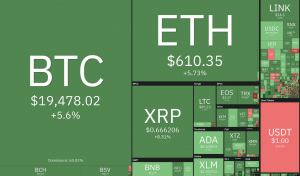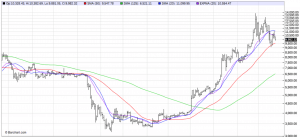The finance world has always been filled with curiosities. Money is a touchy subject, and people often go to extraordinary lengths to protect their positions. Out of this has emerged the concept of ‘dark pools,’ which are financial trading hubs taking place away from the public’s eye.
What are dark pools? How did they come to be? We’ll be looking at that and more in this article. Importantly, we’ll see the role they’ve played in the crypto space, if any.
Understanding a Dark Pool
A dark pool is a privately arranged venue/hub/platform where financial instruments’ trading is held. Dark pools are in direct contrast with public exchange markets, which are heavily regulated and have a lot of media visibility. A dark pool has no publicly available order book, nor is its trades publicly visible (or are only visible once executed).
Dark pools’ liquidity is known as dark pool liquidity. Most dark pool trading is executed in block trades. A block trade is a particularly large volume trade, usually at a predetermined price.
Dark pools hark back to the 80s when institutional investors used them to exchange huge amounts of securities. Dark pools allow traders to place large orders without letting them known their intentions first. This is important because the public knowing their intentions to buy or sell large volumes of a security could negatively impact the trade before they can get to carry it out.
Dark pools have become a substantial part of global financial markets, and we’ll be debunking them further in this article, together with their application in cryptocurrency.
Cryptocurrency dark pools
UK-based crypto exchange Kraken pioneered dark pools crypto in 2016. “Dark pool trading allows for orders to be placed out of sight so that traders can make large buy or sell orders (minimum of 50 bitcoin or 2500 ether) without revealing their sentiment to other traders. Advantages include reduced market impact and better price for large blocks,” said Joseph Powell, CEO.
A few countries around the world have been friendly to the concept of crypto dark pools. This is saying something when you consider the crime reputation that cryptocurrency has. Bermudan digital asset exchange Omega One’s Dark Pool was awarded the country’s first-ever crypto exchange license: “We are now on-boarding select institutions, liquidity venues, and market makers with a trading volume of $10 million a month.”
Why Use Dark Pools?
Let’s say an institutional investor, A, believes Bitcoin’s price will soon take a hit. They decide to sell $1 million worth of BTC to ride out the fall in price safely. But two problems are impeding this proposition. First off, selling such a large amount of BTC on any open exchange will impact the market one way or another. They don’t want to cause such a large ripple in the market.
The other problem is, no buyers are willing to purchase such a huge amount of Bitcoin, at least immediately. So they will have to break down the sale into the more manageable pieces of $50,000 at a time, 20 times.
This means:
- They will incur charges on all the 20 sales.
- The sale will affect the market and probably send retail investors offloading as well, causing the price to crash.
- The sale could end up being more costly – it’s highly likely they will not be able to sell each BTC at the going price, but lower.
If the institutional investor used a dark pool, they’d save themselves from the above unfortunate scenarios. Selling on an open market would expose them to potential loss and send a negative signal to the market.
Advantages of using a dark pool
There are several benefits of taking it dark:
- Avoid impact on market sentiment: Traders who wish to make large trades can do so in a way that they do not send signals to the market.
- Better prices: In a dark pool, both seller and buyer get better prices than they would in the open market. The buyer buys low, while the seller sells high.
- No slippage: The majority of trades in dark pools are usually block-trades set at predetermined prices. Traders know they can execute the trade at the expected price.
Controversies surrounding dark pools
- Conflict of interest: Seeing as the order book is not publicly available, a trader has no way of knowing that a trade was completed at the best possible price. If the entity facilitating the trade has a conflict of interest, they can potentially obfuscate the real price.
- Negative effect on markets: If a large part of trading is happening in dark pools, the real market price may not reflect reality. The finance market relies on the free flow of information, and if a huge part of trading is happening under the radar, the actual market is disadvantaged.
- Vulnerability to predatory practices: Dark pools are perhaps the best playing ground for predatory practices. In particular, high-frequency traders who may have access to order book data can unfairly exploit unsuspecting traders.
- Enabling pinging: Dark pools enable pinging, a questionable practice that involves sending many small orders to obscure a big hidden order. Pinging is used to identify liquidity in order books and can have an unhealthy effect on the market.
- Decreasing popularity: Dark pools are not growing more popular – quite the opposite. This means institutional investors might be moving away from the practice. When their existence is less compelling, their overall effect on the broader market is harmful.
Decentralized dark pools
Just like dark pools in the traditional finance market, dark cryptocurrency pools are available on some exchanges, as we previously mentioned. Unlike traditional dark pools, decentralized dark pools enjoy better and more secure verification. Such verification is powered by state-of-the-art cryptography. Also, crypto dark pools are run by automatic protocols that help maintain fairness for all participants and less likely to be manipulated by unscrupulous players. Zero-knowledge proofs and other cryptographic technologies ensure a high degree of transparency and integrity.
If a trade involves more than one blockchain, it can be seen through by cross-chain atomic swaps that are not only cheaper but also remove the bloat associated with third-party intermediaries. Dark pools can also help in illiquid cryptomarkets by enabling traders to conduct high-volume trades without slippage. While a huge order would send a negative signal in an open illiquid market, it wouldn’t have the same effect in a dark pool.
So far, dark pools haven’t had a major effect on the crypto markets due to the relative lack of institutional traders in the space. Whether this will change in the future is anyone’s guess.
Closing Thoughts
Courtesy of their secretive nature, dark pools have been a source of controversy throughout their existence. When a part of investing and trading activity occurs underground, it can never be desirable on any market. However, with decentralized dark pools, we could potentially see a shift in not just how they’re perceived but their usefulness to various players. Open source approaches to dark pools could ensure that everyone uses the same rule book, alleviating much of the associated risk.






